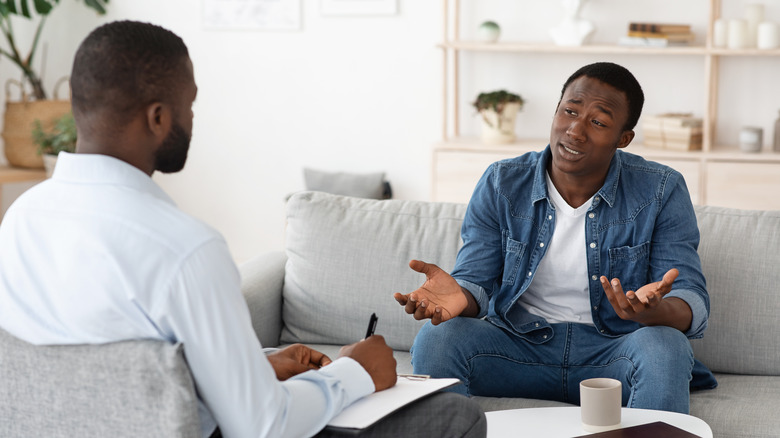Why You Should Be Totally Honest With Your Doctor About Depression
Dealing with depression is difficult, and it can be hard when you feel as if you're struggling with it all alone. It's not uncommon for someone who has depression to feel completely alone, even when they are surrounded by people who love them. According to Mental Health America, individuals going through feelings of depression are also more likely to self-isolate themselves. Along with becoming more socially withdrawn, some noticeable symptoms in someone with depression are persistent feelings of hopelessness and sadness, changes in appetite by eating too much or too little, changes in normal sleeping patterns, and physical symptoms like headaches and nausea (per Cleveland Clinic). Some individuals experiencing depression may also have intrusive thoughts of harming themselves or taking their own lives. For clinical depression to be officially diagnosed, symptoms must last for at least two weeks.
Unfortunately, depression is also significantly common. The Cleveland Clinic explains that 1 out of 6 American adults will have struggled with depression at least once in their lifetime. Depression can also begin in the childhood or adolescent years, with Yale Medicine reporting that research has suggested a child can experience depression from as young as 2 years old.
Despite your initial instincts to isolate yourself during a depressive episode, it's extremely important to reach out to someone for help. If you're feeling depressed, you don't have to go through it alone. You can reach out to your primary care physician or a psychiatrist, who can help you navigate what to do next.
Being honest with your doctor can help you recover
When you become aware of your depression symptoms, it would be beneficial to reach out to a medical professional to discuss your feelings and concerns. Easier said than done, right? According to Mental Health Fitness, many people hesitate to open up due to a fear of being stigmatized by others, or from associating depression with personal failure. Opening up about your mental health will take a lot of courage, but it will also be your best option to feel well again.
Reaching out for help for your mental health isn't a weakness, but a strength. By taking the initiative to speak with your doctor, you may be preventing your depression from getting worse. Depression left untreated can become dangerous, and may contribute to self-injurious behavior or premature death by suicide. It can also increase the likelihood of someone developing other health conditions, such as dementia (per Cleveland Clinic).
Consulting a physician can reassure you that your depression isn't all in your head, but is a serious medical concern, says Family Doctor. People can't know that we need help unless we ask for it. By asking your doctor for help, they can discuss potential treatment options, including counseling or medication.
If you or someone you know needs help with mental health, please contact the Crisis Text Line by texting HOME to 741741, call the National Alliance on Mental Illness helpline at 1-800-950-NAMI (6264), or visit the National Institute of Mental Health website.


